Dairy-Free Cranberry Sauce Fudgesicle Recipe
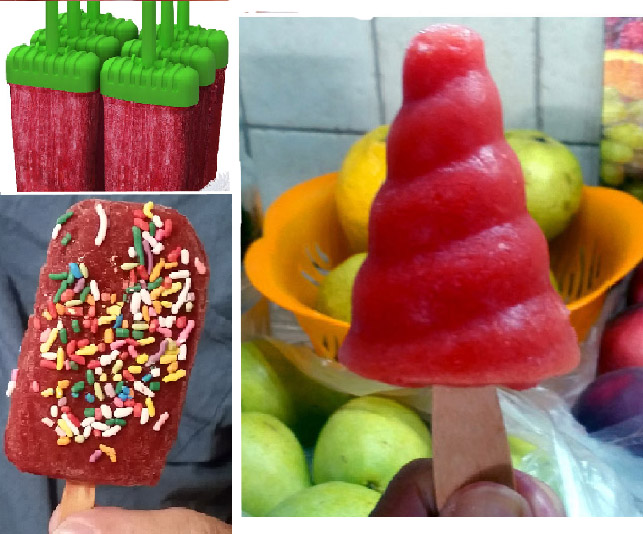
Easy Fudgesicles – Intense Cranberry Sauce Taste,
Dairy-Free, Made with Jellied Cranberry Sauce
(canned or homemade) Jellied Cranberry Sauce
(or frozen berries). No ice-cream churn needed.
* See Health Benefits of Cranberries (below)
(One cup of whole cranberries has 8,983 total antioxidant capacity.
Only blueberries can top that: Wild varieties have 13,427; cultivated
blueberries have 9,019.)
Of course, you can make your own cranberry
sauce to avoid High fructose corn syrup!
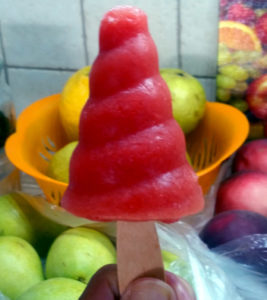
* Here’s How to make Jellied Cranberry Sauce
Makes 1 cup, which will be enough to make
6 popsicles below.
I used to buy the well known all-natural brand until
they changed their ingredients. Watch out for the phrase
“No-sugar-added.” That is an intentional deception.
Manufacturers should be required to state just as boldly,
“sweetened with.”
I hope you’ll no longer support those deceptive companies.
Ingredients to make Cranberry Sauce
1 cup raw sugar
1 cup filtered water
1 12 ounce package Fresh or Frozen Cranberries
Directions: How to make Cranberry Sauce
Combine sugar and water in a medium saucepan. Bring
to a boil; add cranberries, return to a boil. Reduce heat and
boil gently for 10 minutes, stirring occasionally.
Place a wire mesh strainer over a medium mixing bowl.
Pour contents of saucepan into strainer. Mash cranberries
with the back of a spoon, frequently scraping the outside
of the strainer, until no pulp is left.
Stir contents of bowl. Pour into serving container. Cover
and cool completely at room temperature. Refrigerate
until serving time.
Makes 1 cup, which is enough Cranberry Sauce
to make 6 popsicles.
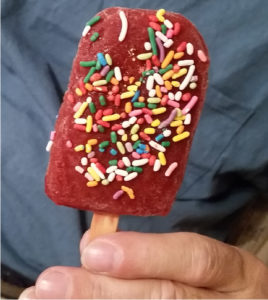
Have you looked at the ingredients of most
packaged ice cream lately? We’ve decided our
delicious homemade frozen treats will be our
only ice cream.
You can use ready-made cranberry sauce for
these pops, but why?
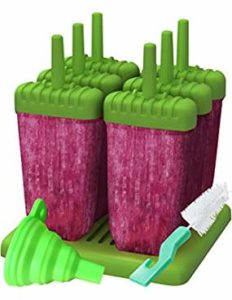
If you can’t find popsicle molds locally, you can
find an abundance of choices online, including
Walmart, Bed Bath and Beyond, and Amazon.
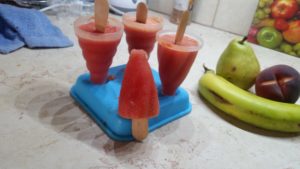
This Recipe Makes 6 molded popsicles.
Ingredients:
1/8 cup +1-1/2 tsp coconut cream
1 and 1/8 cups jellied cranberry slices
1 small frozen banana broken in pieces
1 to 2 tbsp maple syrup (to taste) Some sweetness
gets reduced when frozen. (Don’t use sugar-free
sweetener. It tends to be too icy).
1/8 tsp salt
1/2 teaspoon of vanilla extract or vodka or
sweet red wine will help keep
mixture from freezing rock hard.
Optional: After removing from mold,
Press Moist Pops on a dish or parchment
paper full of sprinkles
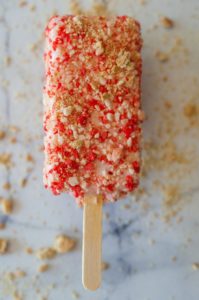
Instructions
For dairy-free fudgsicles I use coconut cream in place
of yogurt. I look for at least 75% coconut and 22% fat.
Unlike other fats, coconut saturated fat has heart-healthy
omega 3.
* See Health benefits of coconut cream.
(You can also use non-dairy yogurt). If you want the the
classic tart yogurt flavor, you may add apple cider vinegar
to taste (1/2 tsp to 1 tsp).
Place slices of jellied cranberry sauce pieces. Combine
all ingredients in food processor until smooth. (Omit vanilla
if using vanilla-flavored yogurt.)
I recommend using a food processor or blender or immersion
blender to ensure thorough blending. Taste, and add more
sweetener if needed – you want the mixture to taste a little too
sweet, as sweetness level will decrease once frozen.
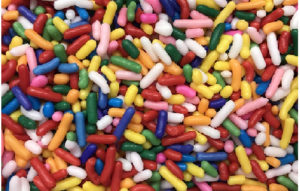

For the kids, just press the moist pops on a
dish of sprinkles.
Pour into popsicle molds. Stand on flat surface in
freezer. After about a 2 hours, insert popsicle
sticks into the fudgsicles and return them to the
freezer. Allow about 6 hours to freeze and serve.
================================
* Health Benefits of Cranberries
We know cranberry sauce as a staple at the holidays, but
cranberries are a superfood that you should enjoy all year
round.
Slipping Cranberries into Your Diet
Here are a few ideas for getting these antioxidant
powerhouses into your life:
- Add dried cranberries to your favorite cereal
- Drink 100% fruit juice that includes cranberries
- Sneak cranberries into blueberry muffins for added
color and flavor - Pair cranberries with chicken dishes
Starting with recipes, dried cranberries are famous for the
delicious flavor and chewy tartness they lend to fresh spinach
salad with pecans and feta cheese, or chopped with other fruits
such as oranges, apples, and pineapples.
Cranberries have vitamin C and fiber, and are only 45 calories
per cup. In disease-fightingantioxidants, cranberries outrank
nearly every fruit and vegetable–including strawberries,
spinach, broccoli, red grapes, apples, raspberries, and cherries.
One cup of whole cranberries has 8,983 total antioxidant capacity.
Only blueberries can top
that: Wild varieties have 13,427; cultivated blueberries have
9,019.While they are available frozen year-round, in fall and
winter you can buy cranberries fresh. Fresh cranberries stored
in a tightly-sealed plastic bag in the refrigerator will last up to
two months.But be careful: If one starts to get soft and decay, the others
will, too–so remove soft ones before you store them. Cooked cranberries
can last up to a month in a covered container in the fridge. But in
the end, each little red berry is worth its weight in nutritional attributes
that can benefit nearly every area of the body.Scientists already know of
cranberry’s ability to prevent heart disease, ulcers,urinary tract infections,
and cancer, not to mention the ongoing advantages from the many vitamins,
minerals, antioxidants, and phytonutrients it contains, such as anthocyanidins,
cyanidin, peonidin, and quercetin.So remember, whenever you add cranberries to your table,you’re getting a
double dose of goodness.Cranberry juice is renowned for its effectiveness
in treating urinary tract infections because it inhibits bacteria from attaching
to the bladder and urethra.How does the same premise prevent cavities
and gum disease? Another gram-negative bacteria, Streptococcus
mutans, keeps plaque from sticking to the surface of your teeth. This is
a perfect example of how some bacteria in the body can be good.
Antioxidants and phytonutrients in cranberries, such as oligomeric
proanthocyanidins, anthocyanidin flavonoids (which give them their bright
red color), cyanidin, peonidin, and quercetin, have unique health-impacting
attributes. They may contain stroke-and cardiovascular disease-preventing
compounds that discourage cholesterol from forming in the heart and
blood vessels.
Research bears out that cranberries also protect against cancer, particularly
breast cancer, due in part to potent antioxidant polyphenols.
The fiber in cranberries is another big benefit, providing 20% of the daily
recommended value in every serving for maintaining a flushed system.
The same amount is found in manganese.
One serving of cranberries also provides 24% of the daily value (DV) in
vitamin C, along with vitamin E (alpha tocopherol), the only form of this
powerful antioxidant actively maintained in the human body.
Fresh cranberries contain the most antioxidants; dried cranberries run a
close second, but bottled
cranberry juice contain the least. Make sure when buying juice or juice
cocktails that it’s 100% juice and not a “drink” which often (always) includes
added sugar or high fructose corn syrup.
Because cranberries and cranberry juice contain oxalic acid and can also
enhance the anticoagulantcapacity of certain medications, individuals with
urinary tract stones and those on warfarin therapy should limit their intake
of these foods and beverages.
However, consume cranberries in moderation because they contain
fructose, which may be harmful to your health in excessive amounts.
Are sweetened dried cranberries good for you?
Dried cranberries contain the same nutrients as fresh cranberries
processes substantially reduce the vitamin A and vitamin C content.
The nutrient density is also reduced if sugar is added.
http://foodfacts.mercola.com/cranberries.html




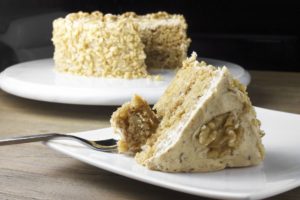
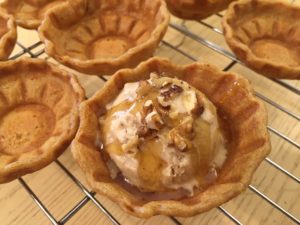
You must be logged in to post a comment.